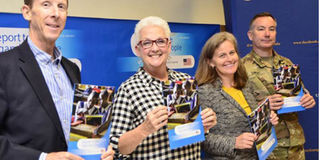US spends Shs3.6 trillion on health, education in Uganda

Left to Right: USAID Mission Director Joakim Parker, Ambassador Deborah Malac, CDC Country Director Lisa Nelson and US military attache’ E. J. Dupont at the release of the US Mission’s annual report in Kampala yesterday. PHOTO BY ALEX ESAGALA
Kampala- The US government spent Shs3.6 trillion on providing improved health, security, education and democratic services in Uganda last year, the country’s ambassador has said.
“The US provided more than $971 million (about Shs3.6 trillion) in assistance to Ugandan people, making Uganda one of the biggest recipients of US bilateral aid in the world. This assistance helps Ugandans access education and economic opportunities and take full part in civic and political life,” Ms Deborah Malac told journalists at the American Embassy in Kampala yesterday.
She was speaking at the release of the US Mission’s annual report dubbed ‘Report to the Ugandan People’. The report recognises the huge influx of refugees into Uganda and the role that different partners play in ensuring that they provide food, healthcare, shelter, water infrastructure, sanitation and education.
Lion’s share
The report indicates the health sector received the biggest share of $500 million (Shs1.9 trillion) for training health professionals, fighting HIV/Aids, malaria, reducing maternal and child deaths, and strengthening systems to better handle buying of drugs, storing and distributing them.
Centers for Disease Control country director Lisa Nelson said they continue to support Uganda to build its capacity to detect and control infectious disease outbreaks.
“Some populations are really left out. Men are left behind in knowing their (HIV) status and going on treatment and young people in general. Uganda is doing well on treatment and once we get everybody on board, we should be able to achieve our target,” Dr Nelson said.
“Uganda has capability to diagnose infections. I have worked in many parts of the continent; some of these things are not present but institutes such as the Uganda Virus Research Institute are world class and you are fortunate that you are able to detect any infections,” she added.
Ms Brooke Olster, the Peace Corps director of programming and training, said they are attracted to invest in Uganda because the people “are the most warm and welcoming in the world.”
Ms Malac said there are several efforts towards restoring peace in South Sudan and DR Congo so that the refugees feel comfortable and safe to return home.
“We continue to be very impressed with the government of Uganda and thank the Ugandan people. Reality is that when you speak to Ugandans, they understand why people are seeking refuge and they feel that they have to help. That is an extraordinary position that you are so welcoming to people who are already experiencing conflict,” she said.
“We thank you because these people need help and they found it in Uganda. It is sad to say that your neighbours do not have the same or globally, most countries in the world don’t have such open doors. Thank you for that,” she added.



